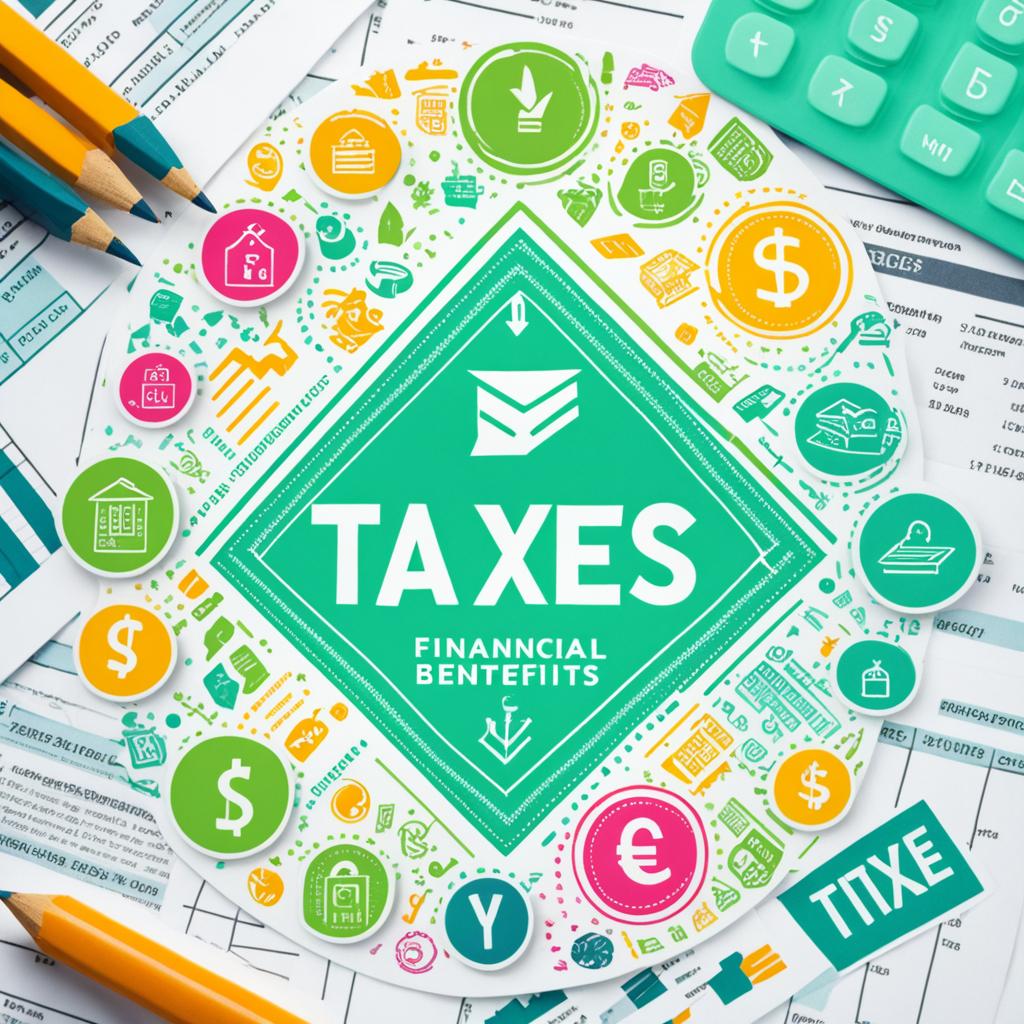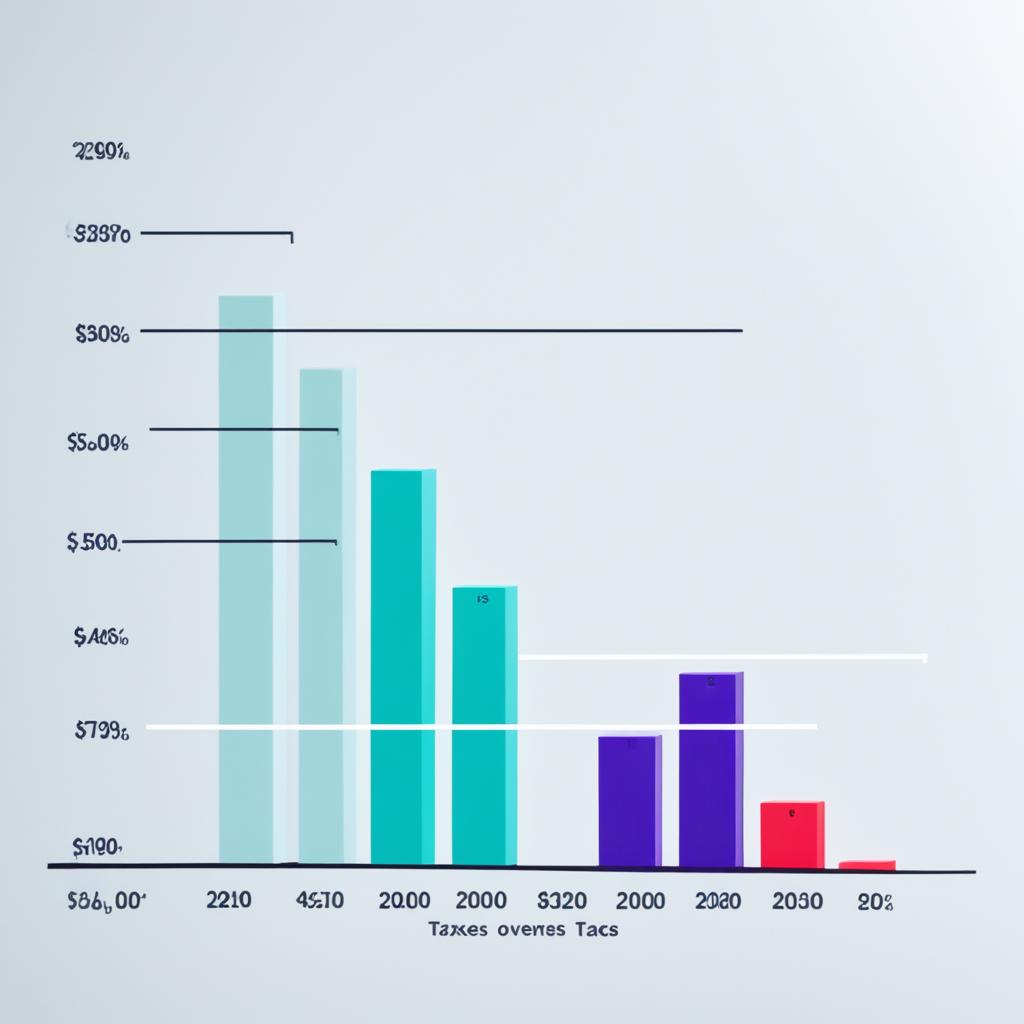Filing taxes is a must for many who live and work in the U.S. Sometimes, even with a low income, filing can lead to getting your taxes back. This happens through refundable tax credits or taxes already taken from your pay.
I’ll help you understand if you need to file taxes. We’ll look at income levels, age, your filing status, and more. Knowing these can keep you in line with the law and possibly get you some benefits.
Key Takeaways:
- Most U.S. workers must file taxes if their income is above a certain amount.
- Whether you need to file depends on age, how you’re filing, and your earnings.
- Filing can still be good for you even if not required. You might get credits or refunds.
- People with their own businesses or who depend on someone else for support have special rules.
- The IRS offers a tool called the Interactive Tax Assistant to see if you need to file.
Who Must File
Figuring out who needs to file taxes is crucial. U.S. citizens or permanent residents working in the U.S. and meeting certain conditions must do so.
You must file a tax return if your income is above a certain amount. This amount depends on your filing status and age. Also, earning $400 or more from self-employment requires a tax return.
Filing taxes is a way to report income and meet government requirements. It’s key to know if you need to file taxes based on your situation.
If you’re not sure about filing, check the IRS guidelines or talk to a tax expert. They can clarify your tax duties and ensure you follow the laws.
Remember, filing a tax return can be beneficial even if it’s not required. You might get a refund due to tax credits or withheld taxes from your wages.
Filing Status for Tax Return
Your filing status is crucial in deciding if you must file taxes. The IRS has several statuses:
- Single
- Married filing jointly
- Married filing separately
- Head of household
- Qualifying widow(er) with dependent child
Each status has its own rules and income limits for filing taxes. Knowing these is vital to understanding your tax duties.
“Knowing your filing status is crucial in understanding your tax obligations and whether you must file a tax return.” – IRS
By knowing the tax filing rules, you can fulfill your IRS obligations. Stay updated on your eligibility to avoid penalties and miss no chances for refunds or credits.
Filing Requirements Based on Age, Filing Status, and Income
Filing taxes depends on age, filing status, and how much you earn. Different rules are for different ages and whether you are single or married. This includes being head of household or a qualifying widow(er).
Let’s dive into what you need to know about these rules:
Filing Requirements Based on Age
The amount you need to earn to file taxes changes with age. If you’re younger, you might not have to file unless you earn a certain amount. It’s key to know these rules to follow IRS guidelines.
Filing Requirements Based on Filing Status
Your filing status changes how much you must earn to file taxes. The IRS has different rules for being single, married, or head of household. Knowing your correct filing status helps you file your taxes right.
Income Thresholds for Filing Taxes
Whether you need to file a tax return depends on how much you earn. This changes with your age and filing status. Knowing where you stand helps you avoid penalties.
Getting through tax season can be tricky. It’s smart to talk with a tax expert or use IRS online tools. They give tailored advice to make sure you file correctly.
Filing Requirement for Dependents
Understanding tax filing for dependents is key. If you’re a dependent, you may need to file based on your income. This depends on a few factors.
The IRS decides if dependents must file by looking at their income. There’s an income limit for dependents. If you go over it, you must file. This rule is apart from the taxpayer’s status.
What do dependents need to know about filing? The IRS has rules about this. If your income is over a certain limit, you have to file. This limit changes with your age and status.
Earned and unearned incomes are both important for dependents. A part-time job might mean you have to file. Also, things like dividends or interest can make filing necessary.
It’s crucial for dependents to know when they must file. Not filing can lead to penalties. It also might affect future tax benefits.
To know your filing needs, look at the IRS rules or get tax advice. This helps you follow the law and get any tax breaks.
| Dependent Filing Requirement | Single | Married Filing Jointly | Head of Household |
|---|---|---|---|
| Under 65 Years Old | $12,400 | $24,800 | $18,650 |
| 65 Years Old or Older | $14,050 | $27,600 | $20,300 |
Self-Employment and Tax Return Filing
When you’re self-employed, knowing how to handle your taxes is key. You don’t have taxes taken out of your pay like other workers. Instead, you need to file a tax return and pay taxes by yourself. Let’s take a look at the main things to know about self-employment and taxes.
Income Threshold for Filing Taxes
If you make $400 or more from self-employment, you have to file a tax return. This rule is the same no matter your age or how you normally file. Keep an eye on what you earn so you follow tax rules.
Quarterly Estimated Taxes
Self-employed people also have to pay taxes every few months, not just once a year. These payments are based on how much you think you’ll owe in taxes for the year. If you don’t make these payments, you could face extra costs.
Expenses and Deductions
One good thing about being your own boss is writing off certain costs. By tracking your business costs, you could pay less in taxes. Things like office supplies, equipment, travel, and professional fees can often be written off.
“Handling taxes when you’re self-employed means being very organized. It’s smart to talk to a tax expert or use software to make sure everything is right and you’re saving where you can.
Self-Employment Tax
Self-employed folks also pay taxes for Social Security and Medicare. This tax is based on your business’s net earnings. Remember to include this tax when figuring out your total tax bill.
Seeking Professional Guidance
Dealing with self-employment taxes can seem hard. It’s a great idea to get help from a tax pro who knows about self-employment taxes. They can guide you on your taxes, help find deductions, and make sure you’re doing everything right for the IRS.
By keeping up with tax rules and taking charge of your taxes, you can file without stress. Always report your income and expenses correctly and pay your taxes on time. This keeps you in good standing as your own boss and helps avoid trouble.
| Tax Tips for Self-Employed Individuals | Benefits of Seeking Professional Guidance |
|---|---|
|
|
Benefits of Filing Taxes Even If Not Required
Filing taxes can be good for you, even if it’s not required. You may get tax credits and refunds. These can put extra cash in your hands. They can cut down what you owe or give you a refund.
The earned income tax credit (EITC) is one you might get. It’s for those with low to moderate income. It can give you a big financial boost. By filing, you find out if you qualify and might get money back.
The child tax credit is another one. If your kids are under 17, it’s for you. It can lessen your taxes. Part of it may be refundable, giving you a refund. Filing lets you claim this credit and support your family financially.
“Filing taxes, even when not required, can help you access refundable tax credits that can boost your finances and provide much-needed financial support.”
Filing taxes opens doors to more benefits and deductions. It lets you report what you earn and spend accurately. You might pay less in taxes as a result. This can mean more money for you.
If tax was taken out of your pay, you need to file to get a refund. You just give the needed documents and info. You’ll get back any extra tax paid. Use it how you wish, like paying bills or saving.
As shown, filing taxes has many plus points, even if it’s not a must. It can get you tax credits and maybe a refund. Filing can better your financial status. So, don’t skip out on these perks. Make sure to file your taxes.
Taxable Income and Reporting Requirements for Social Security Benefits
If the only money you get is from Social Security, you likely won’t need to file taxes. Still, it’s key to know when you might need to report other income. This could change whether your Social Security money is taxed.
Earning more through things like interest or dividends can make your Social Security taxable. The IRS has a special formula. It looks at your total income, including half of your Social Security, to decide.
Here’s a simple guide on when to report Social Security income:
- No tax return needed if your income is below the IRS limit.
- You must report your benefits and possibly pay taxes if your income is over that limit.
Wondering if your Social Security is taxable? Try the IRS’s online tool or ask a tax expert. They can explain the rules for your specific situation.
It’s smart to keep an eye on all the money you get during the year. This includes your Social Security. Being proactive helps you follow tax rules and avoid any trouble with the IRS.
So, people who only get Social Security usually don’t file taxes. But, having extra income means you should know about reporting. Being aware and following the rules ensures you handle taxes right and stay in good standing.
Filing Taxes for Minors
Kids who make money might have to think about taxes. The IRS has income rules for minors. This includes money from jobs or things like interest.
If a kid makes more than allowed, they might have to file a tax return. Or, their earnings could go on their parent’s tax return. It’s key for kids and their guardians to know these tax rules.
Filing Requirements for Minor Income
Minors earning income: Kids making money follow the same tax rules as adults. They must file a tax return if their income is too high.
Included on parent or guardian’s return: Sometimes, a kid’s income can be on a parent’s tax return. This works if the kid is under a certain age and makes a certain amount.
Tax filing for minors can seem tough. There are different rules, deductions, and credits to know. Talking to a tax expert or using software can help make sure everything is right.
Knowing about taxes is important to avoid mistakes. By learning these rules early, kids can start good money habits. This helps them stay in line with IRS rules.
| Income Thresholds for Filing Taxes (2022) | Not Dependent | Dependent |
|---|---|---|
| Single (under 65 years old) | $12,550 or more | $1,100 or more |
| Head of Household (under 65 years old) | $18,800 or more | $1,100 or more |
| Married Filing Jointly (both spouses under 65 years old) | $25,100 or more | $1,100 or more |
| Married Filing Separately (any age) | $5 for any income | $1,100 or more |
| Qualifying Widow/Widower (under 65 years old) | $25,100 or more | $1,100 or more |
Special Circumstances That Require Filing Taxes
Most people know the usual rules for filing taxes. But, some special situations may require you to file. Knowing these can help you follow IRS rules and avoid fines.
If you make money on your own, you may need to file taxes. This is true for freelancers, gig workers, and business owners. You must report money from work and sales.
Having investment income can also mean extra filing needs. This includes money from interest or dividends. You must report this income if it goes over set amounts.
Remember, you must report any interest or dividends over $10 on your tax return.
Some tax credits mean you must file a return. This is the case if you can get the earned income tax credit (EITC) or child tax credit. These credits can lower what you owe or increase your refund.
Always check with a tax expert or IRS guidelines for each special situation’s rules.
Knowing about these special tax situations helps you file correctly. It also lets you use all the tax benefits you can. Keep good records of your money, costs, and any important papers to make filing easier.
Next, we will look at a helpful IRS tool. This tool helps people figure out their tax filing needs based on their own situations.
Using the Interactive Tax Assistant for Filing Determinations
Filing your taxes can be tricky. The Interactive Tax Assistant by the IRS is here to help. It offers personalized advice for your tax situation.
Got questions on filing status, dependents, or deductions? The Interactive Tax Assistant covers it all. It gives you reliable info with just a few clicks.
Just head to the IRS website and look for the Interactive Tax Assistant page. You’ll answer questions about your tax situation. The tool makes sure you give all needed details.
After you answer the questions, you’ll get advice on if you need to file a tax return. This advice is based just on your situation. You’ll also get extra help and resources.
The Interactive Tax Assistant is great for both new and experienced filers. Its easy interface and detailed guidance help you understand your tax duties.
Benefits of Using the Interactive Tax Assistant
The Interactive Tax Assistant brings many advantages:
- Accurate and personalized guidance: It gives advice that truly fits your tax situation.
- Time-saving: This tool makes finding out about tax laws quick and easy.
- Confidence in your filing decisions: You can be sure you’re making the right choices for your taxes.
- Access to additional resources: It not only figures out what you need to do but also offers more help.
- Convenience: You can use the Interactive Tax Assistant any time, making tax questions less stressful.
Whether your tax situation is simple or complex, the Interactive Tax Assistant is a helpful tool. It helps you deal with tax rules confidently. Make sure you’re meeting your tax responsibilities the right way.
Image:
| Tool Name | Features |
|---|---|
| Interactive Tax Assistant |
|
Benefits of Filing Taxes Even If Not Required
Filing taxes can be good even if it’s not required for you. You might get to claim tax credits and maybe get money back.
You can get refundable tax credits by filing. Credits like the earned income tax credit (EITC) or child tax credit are examples. They may lower your tax bill. You could get money back even if your paycheck didn’t have taxes taken out.
By filing, you can also claim back any federal income tax taken from your paycheck over the year. If you had taxes taken out but earned less than the required amount to file, you can get that money back by filing a return.
Filing your taxes can also help you in the future. It makes a record of your tax returns. This might help you qualify for some government programs or financial help later on.
Filing taxes, even if not necessary, can help you get refundable tax credits and possibly a refund. It’s a smart move for your money.
It’s wise to file your taxes even if you don’t have to. Doing so lets you possibly claim tax credits and any tax taken out of your pay. It also builds a good tax record for the future.
Benefits of Filing Taxes Even If Not Required:
- Eligibility for refundable tax credits
- Potential tax refunds
- Financial assistance and government program eligibility
- Establishment of a beneficial tax record
Filing your taxes, even if not needed, can make you more secure financially. It can open up helpful opportunities for you and your family.
| Benefits of Filing Taxes Even If Not Required: |
|---|
| Eligibility for refundable tax credits |
| Potential tax refunds |
| Financial assistance and government program eligibility |
| Establishment of a beneficial tax record |
By filing your taxes proactively, you can enjoy these advantages and build a better financial future.
Benefits of Filing Taxes Even If Not Required
Filing taxes isn’t always a must for everyone. But there are good reasons to do it. Even if you make less than the limit for filing, doing your taxes can help you out a lot.
One big reason is to get refundable tax credits. Credits like the earned income tax credit or child tax credit can give your finances a lift. They help people with low to medium income. You can get money back even without owing taxes.
Filing taxes lets you claim deductions and other credits too. By sharing your income and spending correctly, you can use breaks. Breaks for student loan interest, home mortgage interest, or saving for retirement are included. These can lower how much tax you owe and put money back in your pocket.
“Filing taxes, even if not required, can unlock financial benefits that you may not be aware of. By taking the time to file a tax return, you can potentially receive refundable tax credits and claim deductions that can significantly impact your financial situation.”
– [Your Name]
It also lets you fix any mistakes in how much tax was taken from your pay. If you had taxes taken out, doing your taxes helps fix any mix-ups. You might even get some money back.
Doing your taxes shows you’re managing your money well. It makes it easier to plan for what’s next. It helps make sure you’re following tax laws.
Remember, doing your taxes is more than just a rule to follow. It can make your finances better by using tax credits and deductions. You could get more money back from your taxes.
| Benefits of Filing Taxes Even If Not Required |
|---|
| Access to refundable tax credits that can provide financial assistance |
| Potential to claim tax deductions and credits, reducing your tax liability |
| Opportunity to correct any errors or discrepancies in tax withholding |
| Demonstration of financial responsibility and compliance |
| Possibility to improve your financial situation and maximize tax refunds |
Benefits of Filing Taxes Even If Not Required
Even if it’s not required, filing taxes has benefits. Here’s why you should consider it.
1. Eligibility for Refundable Tax Credits
You can get refundable tax credits by filing taxes. For instance, credits like the earned income tax credit or child tax credit can help. They can lower what you owe or even give you money back. This is great as you can get a refund without having had to pay taxes.
2. Claiming Tax Refunds
Filing taxes lets you get any refund you’re due. If you had taxes taken out of your pay, you can get that money back by filing. It’s a way to give yourself a little bonus.
3. Building a Tax History
Even if not required, filing helps build a record with the IRS. This record is helpful when you want a loan or to finance something. Lenders may ask for your tax filing history and having it can help you qualify.
“Filing taxes, even if not required, can give you financial benefits and a strong financial profile.”
4. Fulfilling Future Requirements
Even if you don’t have to file now, it might be different later. Filing taxes now means you’ll be ready and experienced for later. This makes future tax-filing easier.
5. Peace of Mind
Lastly, filing gives you peace of mind. Knowing you’ve done your tax duty eases concerns about the IRS. It’s always best to follow tax rules to avoid stress and fines.
So, even if you don’t need to file taxes, there are good reasons to do it. You could get credits, refunds, build your tax history, prepare for the future, and relax knowing you’re set. Always check with a tax expert or use software to get all the benefits you can.
| Benefits of Filing Taxes Even If Not Required |
|---|
| Eligibility for refundable tax credits |
| Claiming tax refunds |
| Building a tax history |
| Fulfilling future requirements |
| Peace of mind |

Conclusion
Filing taxes is something most U.S. citizens and residents must do if they work. It’s key to know the rules that apply to you. This depends on your income, whether you’re single or married, and your age.
Even if you don’t have to file taxes, it might still be a good idea. You could get money back through tax credits and refunds. For instance, the earned income tax credit or child tax credit could help a lot. Also, if you had taxes taken out of your pay, you could get that money back by filing.
To figure out if you need to file taxes, using tools like the IRS’s Interactive Tax Assistant helps. This tool gives you advice that fits your exact situation.
In the end, filing taxes is not just something you have to do. It could also bring financial benefits. Knowing what you need to do for taxes and using helpful resources can make things easier. It could also mean more money in your pocket.
FAQ
How much money do you have to make to file taxes?
Who must file taxes?
What are the filing requirements based on age, filing status, and income?
Is there a filing requirement for dependents?
What are the filing requirements for self-employed individuals?
What are the benefits of filing taxes even if not required?
What are the taxable income and reporting requirements for Social Security benefits?
Do minors need to file a tax return?
What are the special circumstances that require filing taxes?
How can I determine whether I need to file a tax return?
Source Links
- https://www.irs.gov/individuals/check-if-you-need-to-file-a-tax-return
- https://www.irs.gov/newsroom/who-needs-to-file-a-tax-return
- https://turbotax.intuit.com/tax-tips/irs-tax-return/does-everyone-need-to-file-an-income-tax-return/L7pluHkoW
Money posts:
 How to Do Taxes: Simplified for Beginners (2024)
How to Do Taxes: Simplified for Beginners (2024)
 Best Tax Software: File with Confidence (2024)
Best Tax Software: File with Confidence (2024)
 TurboTax Alternatives: Best Tax Software (2024)
TurboTax Alternatives: Best Tax Software (2024)
 Speak to Someone at IRS: Cut Through The Red Tape (2024)
Speak to Someone at IRS: Cut Through The Red Tape (2024)
 Welcome to W-4 Form: What It Is & How to Fill It Out!
Welcome to W-4 Form: What It Is & How to Fill It Out!
 Child Tax Credit Update Today: What You Must Know (2024)
Child Tax Credit Update Today: What You Must Know (2024)
 Fill Out a W4 for Dummies: Tax Withholding Guide (2024)
Fill Out a W4 for Dummies: Tax Withholding Guide (2024)
 DoorDash Taxes Made Easy (2024 Tax Guide)
DoorDash Taxes Made Easy (2024 Tax Guide)

